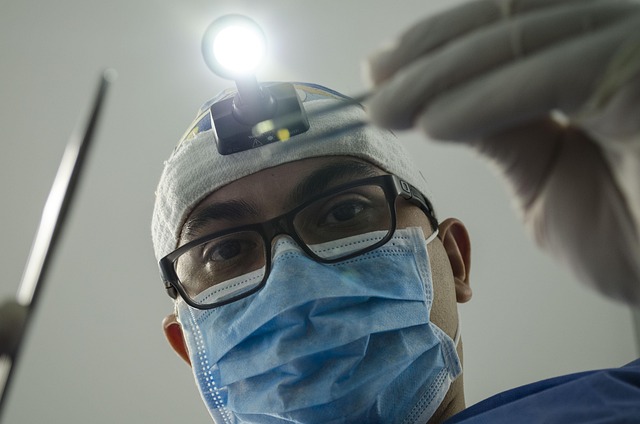McAllen Dentist: When to Visit & Choosing Your Perfect Fit

The first dental visit in McAllen is crucial for oral health maintenance. While the ADA recommends b…….
In the pursuit of optimal oral health, many individuals wonder about the appropriate time to embark on their dental journey. This article delves into the question, “When should I first visit a dentist in McAllen?” by exploring its significance, global impact, economic considerations, technological advancements, policy frameworks, challenges, and future prospects. McAllen, a vibrant city in Texas, serves as a microcosm for understanding the broader trends and implications of dental care accessibility. By the end, readers will gain a comprehensive understanding of why initiating dental visits early is crucial and how it can shape one’s overall well-being.
“When should I first visit a dentist in McAllen?” is a query that many parents and individuals often ponder, marking the beginning of a lifelong dental health journey. Simply put, it refers to the optimal time to initiate regular dental check-ups and care for one’s teeth and gums. This process involves several key components:
Prevention: Early visits focus on preventive measures like oral hygiene education, fluoride treatments, and sealing permanent molars to avert cavities and gum disease.
Early Detection: Dentists can identify potential issues early, such as tooth decay, gum inflammation, or developmental anomalies, enabling prompt treatment.
Education: These visits educate patients about proper dental care routines, diet, and lifestyle choices to maintain oral health.
Establishing a Relationship: Building a long-term relationship with a dentist fosters trust and ensures continuity of care as oral health needs change over time.
Historically, dental care has evolved significantly, shifting from reactive treatment to preventive care models. The concept of regular dental visits gained prominence in the 20th century with advancements in dentistry and an increasing understanding of oral health’s connection to overall systemic health. Today, many healthcare systems worldwide advocate for early dental interventions as a cost-effective strategy for improving public health.
The global impact of “When should I first visit a dentist?” is profound, with varying trends across regions:
| Region | Trends | Influencing Factors |
|---|---|---|
| North America | High emphasis on preventive care, early detection, and access to advanced dental technology. Regular dental visits are considered essential for children and adults. | Strong dental health education programs, private insurance coverage, and a well-established dental infrastructure. |
| Europe | Similar to North America, with a focus on preventive dentistry. However, there are regional disparities in access to care, particularly in rural areas. | Diverse healthcare systems, public funding, and cultural attitudes towards oral health. |
| Asia | Rising awareness about oral health, but variations in dental care practices due to economic disparities. Urban areas often have better access to dental services. | Economic growth, urbanization, and government initiatives promoting oral health education. |
| Africa | Disparities exist, with limited access to dental care in rural regions. Efforts are underway to improve oral health awareness and infrastructure. | Economic challenges, lack of dental professionals, and inadequate healthcare infrastructure. |
These trends highlight the need for tailored strategies to address dental care accessibility, particularly in regions facing economic or infrastructural barriers.
The economic aspects of “When should I first visit a dentist?” are multifaceted, impacting both individuals and societies:
Market Size: The global dental market is substantial, projected to reach USD 174.2 billion by 2027, with preventive care services accounting for a significant share. (Source: Grand View Research)
Investment Patterns: Private investments in dental technology and practices are on the rise, driven by the demand for advanced treatments and improved patient experiences.
Cost-Effectiveness: Early dental interventions can reduce long-term treatment costs associated with complex procedures. Public health initiatives focusing on preventive care have proven cost-effective in many countries.
Access and Affordability: Ensuring affordable access to dental care is crucial, especially for low-income populations. Governments worldwide are implementing policies to address this challenge.
Technology plays a pivotal role in modern dentistry, transforming the way dental care is delivered:
Digital Imaging and Diagnostic Tools: Advanced imaging techniques like digital X-rays provide clearer, more detailed images, aiding in precise diagnoses. Computer-aided design (CAD) software enhances dental implants and restorations.
Laser Dentistry: Laser technology offers precise, minimally invasive procedures for various conditions, including gum disease treatment and tooth whitening.
3D Printing: This technology enables the creation of custom dental devices, models, and even biomaterials for regenerative medicine.
Teledentistry: Remote consultations via video conferencing offer accessible care, especially in areas with limited dental professionals.
These advancements not only improve treatment outcomes but also enhance patient comfort and convenience.
Key policies and regulations govern the practice of dentistry, ensuring quality care and patient safety:
Licensing and Registration: Dentists must obtain licenses and registrations from relevant authorities, adhering to education, training, and examination requirements.
Health Regulations: Dental practices are subject to health and safety standards, including infection control protocols, waste management, and radiation exposure limits.
Insurance Coverage: Many countries have public dental insurance programs, while others offer private coverage. These policies dictate what services are covered and reimbursement rates.
Quality Assurance: Regulatory bodies conduct inspections and audits to ensure dental practices maintain high standards of care.
Despite its benefits, “When should I first visit a dentist?” faces several challenges:
Access Disparities: Rural and underserved communities often struggle with limited access to dental services, leading to oral health inequalities.
Cost Concerns: Dental care can be expensive, deterring individuals from seeking regular check-ups. Lack of insurance coverage or inadequate plans contribute to this issue.
Stigma and Misconceptions: Some people avoid dental care due to fear, anxiety, or outdated beliefs about painful procedures.
Strategies for Addressing These Issues:
Community Dental Programs: Establishing community dental clinics and mobile units can reach underserved populations.
Subsidies and Discounts: Offering financial assistance and sliding fee schedules improves access for low-income patients.
Public Awareness Campaigns: Educating the public about oral health, dispelling myths, and promoting early intervention can encourage regular dental visits.
Case Study 1: Community Dental Initiative in Rural India
A non-profit organization launched a community dental program in a remote village in India, addressing severe oral health disparities. They partnered with local healthcare workers to conduct door-to-door screenings, provide basic treatments, and educate villagers on oral hygiene. The initiative resulted in improved oral health awareness, increased access to care, and significant reductions in tooth decay among children.
Lessons:
Case Study 2: Teledentistry Implementation in Urban Canada
A Canadian dental clinic introduced teledentistry services, offering remote consultations and follow-ups for patients unable to attend in-person visits. This approach successfully reached a diverse patient population, including those with limited mobility or work commitments. The program’s success led to increased access to care, reduced no-show rates, and improved patient satisfaction.
Lessons:
The future of “When should I first visit a dentist?” holds exciting possibilities:
Personalized Dentistry: Advancements in genetics, artificial intelligence, and digital technologies will enable personalized treatment plans based on individual needs and risk factors.
Preventive Technologies: Wearable sensors and advanced oral health apps can monitor oral hygiene practices, providing real-time feedback to prevent issues before they arise.
Regenerative Dentistry: Stem cell therapy and 3D printing may revolutionize tooth regeneration, offering new possibilities for restoring damaged dentition.
Global Collaboration: Sharing best practices, research findings, and technological innovations across borders can enhance dental care standards worldwide.
In conclusion, “When should I first visit a dentist in McAllen?” is a query that resonates globally, underscoring the importance of oral health as an integral part of overall well-being. This article has explored various facets, from historical context and global trends to economic considerations and technological advancements. The evidence is clear: initiating dental visits early provides a solid foundation for lifelong oral health. By addressing challenges, embracing innovations, and fostering collaboration, we can ensure that everyone, regardless of location or background, has access to quality dental care from the very beginning.
Q: How often should I visit the dentist?
A: The frequency varies based on age, oral health history, and risk factors. Children usually need check-ups every 6 months, while adults may require visits every 3-6 months.
Q: Can baby teeth be neglected since they fall out?
A: No, maintaining healthy baby teeth is crucial as they play a vital role in speech development, proper jaw alignment for permanent teeth, and overall oral health.
Q: Is dental care expensive?
A: The cost varies widely depending on the procedure and location. Many countries have public dental insurance programs, and private insurance can help offset expenses. Financial assistance programs are also available for low-income individuals.
Q: How can I overcome my fear of the dentist?
A: Communicate your fears to your dentist. Modern dentistry offers various relaxation techniques, such as deep breathing exercises and sedation options, to make visits more comfortable.
Q: What are some signs that I need to see a dentist immediately?
A: Prompt attention is required for severe tooth pain, swelling, or bleeding gums; abscesses; or any sudden changes in oral health that cause discomfort or concern.

The first dental visit in McAllen is crucial for oral health maintenance. While the ADA recommends b…….

Understanding dental care in McAllen begins with a holistic approach combining preventive measures a…….

Optimal dental care in McAllen begins with a first visit around one year old or when the first tooth…….

Understanding dental insurance coverage is crucial before visiting a dentist in McAllen. Research yo…….

McAllen residents should visit a dentist for the first time by age one or when their first tooth app…….

In McAllen, dental care is crucial for overall health. Schedule your first checkup at 6 months or wh…….

Establishing a dental routine with regular check-ups (every 6 months) is crucial for optimal oral he…….

Dental bridges require regular care. Signs of bridge issues include persistent pain, loose bridges,…….